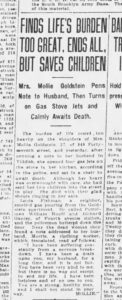I doubt that any news outlet could publish a suicide note today; journalism standards in the 1920’s seem to have been much looser and privacy not a consideration at all. Recently, I searched in Newspapers.com for “Mollie Goldstein in 1926 in Brooklyn, NY,” hoping to find an obituary. Instead, the very first hit was an article in the Standard Union from Sunday, April 4 1926, the day after Mollie died. Entitled “Finds Life’s Burden Too Great, Ends All, But Saves Children,” the brief article detailed how she killed herself, how she was found and by whom, and included a translation of the suicide note she left for her husband.
In my research I have noticed that memory is mutable and idiosyncratic, people remember facts but they also remember what they overhear and what their own mind fills in, based on their opinions, wishes and understandings. This is not mis-remembering; I believe this is how memory works. The fact that so many people remember the exact same situation so differently, and so often, leads me to this conclusion. Here’s an analogy: people hear about 50% of what is said and fill in the rest of the words from their own minds, using context and their own perceptions, desires and rationalizations to do so. Perhaps memory is no different.
The story I remember being told, probably by my father, was that his mother had sent him and his almost-three-year-old sister Jeanette outside to play. My memory is that he told me he found his mother with her head in the oven, but the article states that she was found by police who had been alerted by a neighbor who smelled gas. Perhaps my memory of what my father told me is incorrect or became “enhanced;” perhaps his own memory was flawed. It doesn’t really matter, because we build our conclusions and react to them based on how we remember a situation; our memory becomes the reality that matters.
The article names Mollie’s husband as “Morris,” whereas her husband was Sol Goldstein; Morris was most likely Morris Zlotnick, her brother-in-law. I’m guessing that Sol or someone else called Morris to come over to assist the devastated family and that either the police misidentified him or the reporter (who likely was not on the scene but got the information from the police report) mixed up the names. Her age is listed as 27 and her death certificate says 29, but this kind of discrepancy is very common in documents of the time and the informant may have been unsure of the exact age. The address and date match those in the death certificate, so there is no doubt about the identity of this Mollie Goldstein.
Most important to me is that Mollie’s voice can now be heard. Her despair, her deep depression and sense of futility no longer need to be imagined, she expresses them clearly. Other than a note to her sister that basically says, “See you soon,” these are the only words we have from her, so they are precious.
They are also totally unexpected; how often is anyone privy to a suicide note? This article is an unanticipated treasure, and all it took to get it was to pay a small fee to get past the paywall that the website throws up at a certain point.
As I told Louise and Mark, in my version, Grandpa Sol told me she put her head in the oven and my father found her. When I read this note it hit me like a ton of bricks. It is one thing to know of the suicide; another to be privy to it. Shock, sorrow, understanding of many things follows….